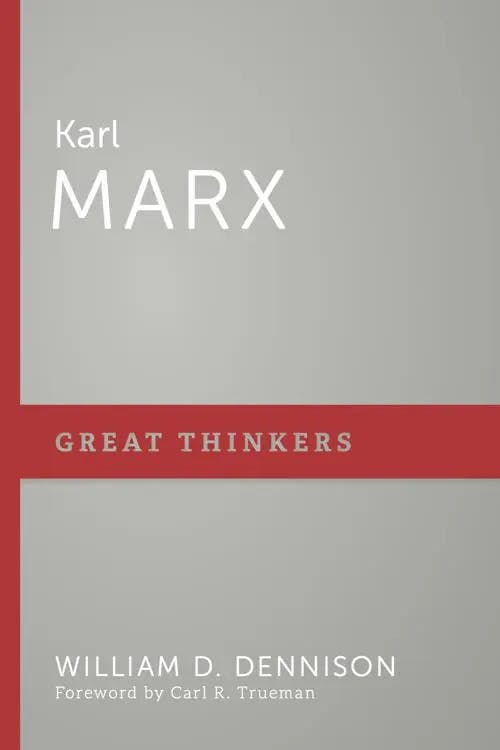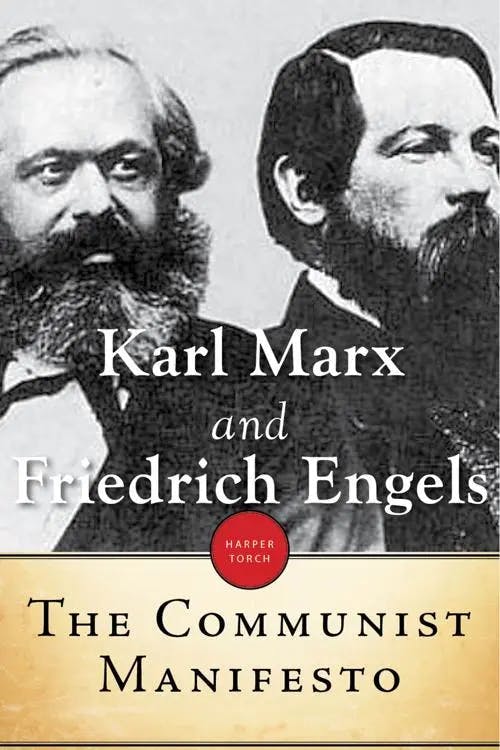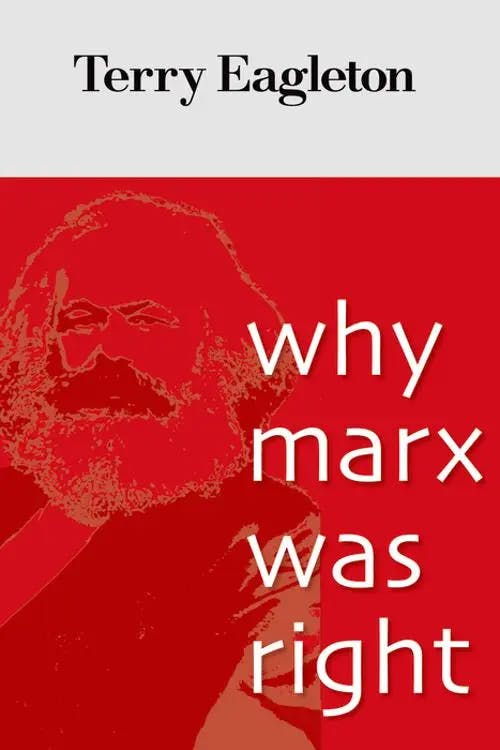What is Marxism?
PhD, English Literature (Lancaster University)
Date Published: 14.02.2023,
Last Updated: 19.07.2024
Share this article
Defining Marxism
Marxism is a social, political and economic philosophy named after German philosopher Karl Marx (1818-83). At its core, Marxism is understood as a critique of capitalism. It examines capitalism’s impact on the worker, suggesting they are exploited and alienated from their own labour. This theory was first outlined by Marx and Friedrich Engels (1820-95) in The Communist Manifesto (1848), which predicted that the struggle between the social classes would inevitably result in a revolution, and the emergence of communism. The ideas espoused in Marx & Engels’ work has formed the basis of communism in countries like Russia since Marx’s death.
Though the theory is named after Marx himself, we cannot understate Engels’ contribution to Marxist political economy. Engels’ The Condition of the Working Class in England (1844) can be seen as the foundation of Marxist theories of labour. For further reference to Engels’ contribution, see Stavros Mavroudeas’ article ‘Friedrich Engels and his Contribution to Marxism’ (2020).
Historical Materialism & Marxist Theory
Central to Marxism is the theory of historical materialism. Historical materialism argues that understanding systems like capitalism requires an investigation into the history of humans, their social institutions and their labour. In Karl Marx (2017), William Dennison writes that, for Marx,
the truth of history begins with the concrete activity of human beings living in the material world. In short, humanity makes history. What is truly there every day is human beings living in the process of development. Furthermore, this formulation and understanding of history replaces the illusions of religion, taking its place as the authentic revealer of truth. (2017)
William D. Dennison
the truth of history begins with the concrete activity of human beings living in the material world. In short, humanity makes history. What is truly there every day is human beings living in the process of development. Furthermore, this formulation and understanding of history replaces the illusions of religion, taking its place as the authentic revealer of truth. (2017)
This approach was used by Marx and Engels in The Communist Manifesto, which examined how capitalism is a social development of history. It states that:
the modern bourgeois society that has sprouted from the ruins of feudal society has not done away with class antagonisms. It has but established new classes, new conditions of oppression, new forms of struggle in place of the old ones. Our epoch, the epoch of the bourgeoisie, possesses, however, this distinctive feature: it has simplified the class antagonisms. Society as a whole is more and more splitting up into two great hostile camps, into two great classes, directly facing each other: Bourgeoisie and Proletariat’ (1848 [2014]).
These two social classes Marx and Engels refer to, the bourgeoisie and the proletariat, can also be conceptualised as the property-holding capitalists and the workers.
The unequal power dynamic of the capitalist and the worker goes beyond the economic; it influences all aspects of the proletariat’s lives. Historical materialism posits that a society’s economic organisation determines its social institutions, such as arts, culture, education and religion. The way a society economically organises itself is known as the mode of production. The mode of production consists of:
- Means of production e.g. tools, machines, factories and resources and labour power.
- Relations of production – who owns the means of production and who works for them.
The Communist Manifesto analysed how the mode of production was configured throughout human history. In feudal societies, for example, the means of production consisted of rudimentary farming tools and livestock; the relations were between serfs and lords who owned the land. In each stage of production throughout history it is evident that there is an exploiter/exploited dynamic. Marx and Engels suggest that this will eventually be overturned, writing that,
the collisions between individual workmen and individual bourgeois take more and more the character of collisions between two classes. Thereupon the workers begin to form combinations (Trades Unions) against the bourgeois; they club together in order to keep up the rate of wages; they found permanent associations in order to make provision beforehand for these occasional revolts. Here and there the contest breaks out into riots’ (1848, [2014]).
Karl Marx, Friedrich Engels
the collisions between individual workmen and individual bourgeois take more and more the character of collisions between two classes. Thereupon the workers begin to form combinations (Trades Unions) against the bourgeois; they club together in order to keep up the rate of wages; they found permanent associations in order to make provision beforehand for these occasional revolts. Here and there the contest breaks out into riots’ (1848, [2014]).
The overturning of this exploiter/exploited dynamic will result, according to Marx and Engels, in a powerful majority i.e. communism.
The Labour Process
As with The Communist Manifesto, Marx’s later, and arguably most notable work, Das Kapital or Capital (1867) assesses how the means of production result in class disparity and exploitation. While The Communist Manifesto is primarily concerned with delineating the trajectory towards socialism, Capital provides a detailed critique of the political economy. In this economic critique, Marx demonstrates exactly how the worker is exploited through his labour theory of value. Below we have detailed out some of the core principles behind this theory, such as labour value itself, as well as the concepts of surplus and alienation.
Labour theory of value
The labour theory of value means that a product’s economic value is determined by the amount of labour needed to produce that product. Though labour theory of value is often associated with the work of Karl Marx, it had previously been referenced in the work of economists such as Adam Smith in The Wealth of Nations (1776) and David Ricardo in Principles of Political Economy and Taxation (1817). Marx’s labour theory of value furthers the theories of Smith and Ricardo by explaining how the labourer is exploited under capitalism. This exploitation occurs through the capitalist’s desire to create surplus value.
Surplus value
Surplus value is the difference between what it costs the manufacturer to make the commodity versus how much it is sold for. As the capitalist owns the means of production (and the worker through a paid wage), the capitalist owns the product and reaps all the surplus value (i.e. profits). This surplus value is created through the unpaid time of the labourer.
Engels had previously written of surplus labour power in The Condition of the Working Classes in England (1844). In Capital, Marx uses the example of the spinner to demonstrate how surplus value is created by extension of the working day and exploitation of the labourer. Marx argues that a spinner must daily produce a value to cover their wages (e.g. three shillings); this is achievable with six hours’ work. The worker in this time adds value to the cotton as ‘during the spinning process, the cotton absorbs six hours’ labor. The same quantity of labor is also embodied in a piece of gold of the value of three shillings. Consequently by the mere labor of spinning, a value of three shillings is added to the cotton.’ (2012 [1867]). The labourer, through the hours spent working and their skills, has added value to the raw materials. However, as previously mentioned, the capitalist desires profits and therefore, must derive this from unpaid labour. Though the labourer after six hours has worked enough to cover their wages (the amount to feed, clothe and shelter him for that day) and has added value to the raw materials, the capitalist extends the working day in order to obtain surplus value. Marx writes that ‘[t]he fact that half a day’s labor is necessary to keep the laborer alive during 24 hours does not in any way prevent him from working a whole day’ (2012 [1867]). This is how the worker is exploited under capitalism: the worker has already covered their wages and yet must continue to work unpaid for the capitalist.
Alienation
Central to the impact of capitalism on the worker is the feeling of alienation due to estranged labour. This alienation is part of the oppression faced by the worker under capitalism. In The Economic and Philosophical Manuscripts (1844), Marx outlines four types of alienation for the worker under capitalism:
- Alienation from their product
The labourer does not own their own product; it is the capitalist who owns and profits from the result of the worker’s labour. Marx writes that the product, therefore, exists as ‘something alien’ to the worker and that ‘the life which he has conferred on the object confronts him as something hostile and alien’ (2012, [1844]) As the worker puts part of their life (energy, effort, time) into the object, when the object ceases to be theirs it creates feelings of alienation.
- Alienation from the activity of labour
Not only does the product not belong to the worker, but the worker’s own life is determined by the activity of labour. Marx writes that ‘the worker’s own physical and mental energy, his personal life’ is ‘turned against him [and] neither depends on nor belongs to him’ (2012, [1844]). Labour thus turns the worker into a machine, forcing them to carry out repetitive and mechanical labour which provides no psychological or creative satisfaction.
- Alienation from the self
This type of alienation relates closely to alienation from the activity of production. Marx further explains how the alienation experienced under capitalist production estranges the worker from their own humanity and their sense of identity. Marx argues that estranged labour makes the predominant activity in the worker’s life ‘a mere means to his existence’ (2012, [1844]). The labourer’s life is determined by the need to work for survival.
- Alienation from other workers
Alienated from their product, activity of labour and himself, the worker now becomes alienated from other workers. The nature of industrial capitalism creates a competitive environment in which workers are pitted against one another.
Criticism of Marxism
Though written in the nineteenth-century, the criticisms of Alfred Marshall in Principles of Economics still resonate with some Marxist critics today. Marshall wrote that:
It is not true that the spinning of yarn in a factory […] is the product of the labour of the operatives. It is the product of their labour, together with that of the employer and subordinate managers, and of the capital employed’ (1890, [2021]).
Marshall’s argument is that the other means of production such as the tools the labourer uses, the materials and the space, also contribute to the product. The capitalist, he suggests, invests in the business which produces the commodity. Marshall further condemns the theory of value by arguing that Marx neglects to address the demand of the customer which inflates the cost of the item, resulting in profits.
Criticisms of Marx’s inconsistencies include those of prominent theorist Paul Sweezy who wrote in The Theory of Capitalist Development that ‘the Marxian method of transformation [of commodity values into prices of production] is logically unsatisfactory’. (115, 1968 [1942]). This ‘transformation problem’ addresses specifically Marx’s argument, in volume 3 of Capital, that the rate of profit tends to fall in capitalism. To give a very basic overview, Marx argues this fall is due to the need of capitalism to expand and become more productive. The capitalist continues to invest and improve the means of production through the use of equipment or more labourers. However, there is only so much demand. As such, the capitalist will, at a point, have decreased profits.
These consistencies, however, have been challenged by the temporal single-system interpretation (TSSI) of Marx’s value theory. As Nick Potts writes in ‘Marx and the crisis’:
The TSSI of Marx has clearly demonstrated that a consistent interpretation of Marx’s value theory exists. Marx’s consistent value theory explains why the profit rate has a tendency to fall in boom, ensuring that booms must end in crises, and helping us to understand how distortion of this process leads to stagnation, with surplus capital taking adventurous paths. (2011)
However, this debate still continues with some arguing that TSSI is an outdated theory and exists to ‘assert that Marx’s formulations, in both the theory of value and the analysis of capitalist accumulation and crisis, are literally and completely correct; that Marx made no errors’ (David Laibman, 2004).
Many aforementioned criticisms hinge primarily on Marx as an economist. A further but related criticism of Marx is that he has been seen as reducing the complex nature of society, politics and culture to economics. However, Randy Martin in ‘Rereading Marx: A Critique of Recent Criticisms’ (1998/99) disputes this, writing that claiming Marx is an economic reductionist is based upon scholars who have ‘pared down his texts to a handful of aphorisms and citations so that they do little more than confirm his own reductionism.’ Martin goes on to state that Marx’s work is:
an account of society’s expansionary dynamic, that provides the basis for (but does not guarantee) political transformation. The critique of capital aims to show how the “ism” or process of expansion (here of profit-taking), rests upon another “ism” that capitalism battles to negate, namely that of the social (1998/1999).
Influence of Marxism
Marxism has continued to persevere into the twenty-first century, despite capitalism’s radical evolution since Marx and Engels’ writing in the nineteenth-century. As Terry Eagleton writes in Why Marx was Right:
Marxism is a critique of capitalism—the most searching, rigorous, comprehensive critique of its kind ever to be launched. It is also the only such critique that has transformed large sectors of the globe. It follows, then, that as long as capitalism is still in business, Marxism must be as well. Only by superannuating its opponent can it superannuate itself. And on the last sighting, capitalism appeared as feisty as ever. (2011)
Terry Eagleton
Marxism is a critique of capitalism—the most searching, rigorous, comprehensive critique of its kind ever to be launched. It is also the only such critique that has transformed large sectors of the globe. It follows, then, that as long as capitalism is still in business, Marxism must be as well. Only by superannuating its opponent can it superannuate itself. And on the last sighting, capitalism appeared as feisty as ever. (2011)
In their introduction to Raya Dunayevskaya’s Intersectional Marxism (2020) Kevin B. Anderson, Kieran Durkin and Heather A. Brown identify a coincidence with the resurgence of Marxism and that of grassroots radical activism with ‘the Yellow Vests and the pension strikes in France, and most dramatically with the outbreak of what is being called the Second Arab Spring in Sudan, Algeria, Iraq, and Lebanon’. The book explores the work of Marxist-feminist Raya Dunayevskaya and shows the relevance of Marxism in studying contemporary issues.
More recently, Transgender Marxism (2021) recognised the role of sex and gender in relation to capitalism, thus demonstrating the application of Marx’s work outside its original scope. In addition to this, Ashley J. Bohrer’s Marx and Intersectionality (2019) demonstrates that Marxist thinking is still relevant in examining issues of intersectionality and marginalisation, writing that ‘capitalism is a necessary element to an analysis of race, gender, sexuality, and class, just as an analysis of these latter is crucial to understanding the ideology, historical practice, and logical structure of capitalism’.
The work of these critics develops the original tenets of Marxism, making them applicable to a modern world in which late-stage capitalism has taken on a form unimaginable to Marx and his contemporaries. Despite the changing nature of capitalism, however, the core ideas of Marxism (e.g. the production of surplus value, the exploitation of the labourer) persist, demonstrating the versatility of Marx and Engels’ teachings.
Further Resources & Reading on Perlego
Callinicos, A, S. Kouvelakis and L.Pradella. 2020. Routledge Handbook of Marxism and Post-Marxism. Routledge. Available at: https://www.perlego.com/book/2029163/routledge-handbook-of-marxism-and-postmarxism-pdf
Kirk, N. 2017. Social Class and Marxism: Defences and Challenges. Routledge. Available at: https://www.perlego.com/book/1488756/social-class-and-marxism-defences-and-challenges-pdf
Mojab, S. 2015. Marxism and Feminism. Zed Books. Available at: https://www.perlego.com/book/2014330/marxism-and-feminism-pdf
Marxism FAQs
What is Marxism in simple terms?
What is Marxism in simple terms?
What is 'The Communist Manifesto'?
What is 'The Communist Manifesto'?
Why is Marxism important?
Why is Marxism important?
What is Marx's most famous book?
What is Marx's most famous book?
Bibliography
Anderson, K. B., K. Durkin and H. A. Brown..2020. Raya Dunayevskaya’s Intersectional Marxism: Race, Class, Gender, and the Dialectics of Liberation. Palgrave Macmillan. Available at: https://www.perlego.com/book/3480617/raya-dunayevskayas-intersectional-marxism-race-class-gender-and-the-dialectics-of-liberation-pdf
Bohrer, A. J. (2019) Marxism and Intersectionality: Race, Gender, Class and Sexuality under Contemporary Capitalism. Verlag. Available at: https://www.perlego.com/book/1461300/marxism-and-intersectionality-race-gender-class-and-sexuality-under-contemporary-capitalism-pdf
Dennison, W. D. 2017. Karl Marx. P Publishing. Available at: https://www.perlego.com/book/2527056/karl-marx-pdf
Eagleton, T. 2011. Why Marx was Right. Yale University Press. Available at: https://www.perlego.com/book/1089799/why-marx-was-right-pdf
Engels, F. 2005 [1844]. The Condition of the Working Class in England in 1844. Perlego. Available at: https://www.perlego.com/book/1820319/the-condition-of-the-workingclass-in-england-in-1844-with-a-preface-written-in-1892-pdf
Gleeson, J. J and E. O’Rourke.2021. Transgender Marxism. Pluto Press. Available at: https://www.perlego.com/book/2646534/transgender-marxism-pdf
Laibman, D. 2004.‘Rhetoric and Substance in Value Theory: An appraisal of the new orthodox Marxism’, in Alan Freeman, Andrew Kliman and Julian Wells, The New Value Controversy and the Foundations of Economics. Edward Elgar.
Martin, R. (1998). ‘Rereading Marx: A critique of recent criticisms’. Science & Society, 513-536. Available at: https://www.jstor.org/stable/40403745#metadata_info_tab_contents
Marx, K. 2012 [1844]. Economic and Philosophic Manuscripts of 1844. Dover Publications.
Marx, K. 2012 [1867]. Das Kapital: A Critique of Political Economy. Gateway Editions. Available at: https://www.perlego.com/book/784600/das-kapital-a-critique-of-political-economy-pdf
Marx, K and F. Engels. 2014 [1848]. The Communist Manifesto. Harper Torch. Available at: https://www.perlego.com/book/602671/the-communist-manifesto-pdf
Mavroudeas, S.. 2020. Friedrich Engels and his Contribution to Marxism. Human Geography, 13.2, 187–190. Avalable at: https://journals.sagepub.com/doi/full/10.1177/1942778620937123?casa_token=qjE5Rw3qH28AAAAA:7qjFs4tglqHVURMPS9ywGtGloQcX3inCxEwyCyp9eeYXSIW7AQM7liulWILStVEsKyvh9rrKKDpgSw
Potts, N. 2011. Marx and the Crisis. Capital & Class, 35.3, 455-473. Available at: https://journals.sagepub.com/doi/full/10.1177/0309816811419483
Sweezy, P. M. 1968 [1942], The Theory of Capitalist Development. Monthly Review Press.
PhD, English Literature (Lancaster University)
Sophie Raine has a PhD from Lancaster University. Her work focuses on penny dreadfuls and urban spaces. Her previous publications have been featured in VPFA (2019; 2022) and the Palgrave Handbook for Steam Age Gothic (2021) and her co-edited collection Penny Dreadfuls and the Gothic was released in 2023 with University of Wales Press.



